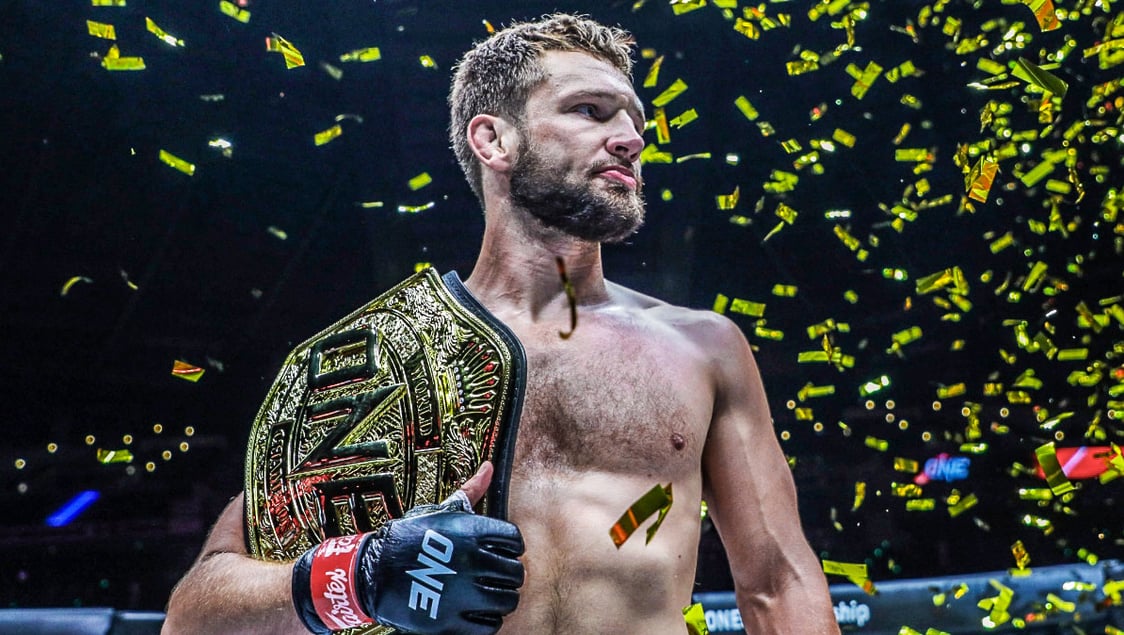
Issue 202
February 2024
Reinier de Ridder, the former ONE middleweight world champion, pulls back the curtain on his life in Holland, his journey to the top, and his career ambitions, which led him to become MMA’s first undefeated two-weight world champion.
The history of MMA will always have a section dedicated to some of the legendary fighters from the Netherlands who have left a lasting impact on the sport. Amongst them, Reinier de Ridder has separated himself from the rest of the pack.
He’s carved out his legacy in ONE Championship as a former two-weight world champion and former middleweight king, who produced 16 consecutive wins before tasting defeat for the first time. “The Dutch Knight” isn’t short on accolades, but much like the caped crusader from whom he draws his nickname, de Ridder is a product of his beginnings that have shaped him into the world champion you see today.
After a loss to Anatoly Malykhim, who beat de Ridder to become MMA's first three-division champion, praise was heaped upon the former champion, by Malykhin after the fight. "This guy is a legend. This guy is the best of the best, my opponent. Everyday, I looked forward to [fighting] this guy. I trained and trained and trained. [He was] 16-0. [We are] two of the best of the best fighters in the world.” To understand his greatness, we pulled back the mask, took off the cape, and sat down for a debriefing with the champ to dive deeper into what lies behind his calm and calculated exterior.
Born From Humble Beginnings
By his own admission, Reinier de Ridder comes from a regular Dutch background. His father works as a taxi driver, and he did well in school, but this story starts to form when he began participating in extracurricular activities at the age of five. Upon realizing he was too young to start training in Karate, the young enthusiast found his way to Judo. The rest, as they say, is history.
De Ridder maintained his love of Judo and regularly competed in competitions in his younger years, working his way towards achieving his black belt status. De Ridder says that his love of Judo is what kept him invested with no outside influences from his family or other influential figures pushing him to maintain his commitment. No other sport ever captivated him the way that his first love had, but all of that changed when he eventually became enthralled by Jiu-Jitsu.
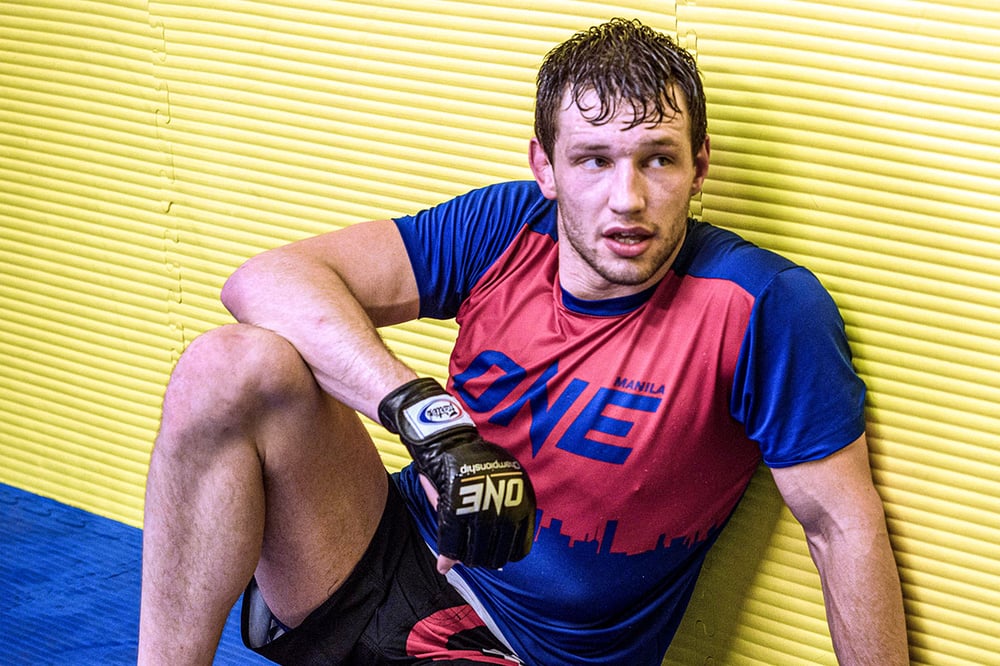
Jiu-Jitsu Doesn’t Work
De Ridder moved to the Dutch city of Breda to continue his studies, leaving him with one dilemma: finding a new home for his Judo passion. Having perceived MMA as a brutal sport, he had no interest in joining its ranks, but convenience was key. Despite now being known as one of the best grapplers in MMA, it’s safe to say that he wasn’t taken with Jiu-Jitsu following his first experience.
“I think I was like 19 years old, and I kind of choked everybody out with the stuff I knew from Judo, even the teacher didn't really want to roll with me,” de Ridder recalls. “There weren't a lot of high belts; it was mostly white and blue belts, and it was kind of pretty easy to beat them all. So, I was like fuck this shit. This doesn't work. Jiu-Jitsu is bullshit.”
After a brief stint playing rugby, he gave Jiu-Jitsu a second try following a recommendation for a better gym. He says it was love at second sight after finally coming up against someone who could test him.
“I went there, I was already a pretty big and strong guy, and all the small guys, I remember like a 70-kilo Brazilian guy blue belt tapped me out, and I was like, this is interesting, I might put some time into this.”
A Champion Grappler Born From A Nation of Strikers
A Dutch world champion who prefers grappling? Surely not? The Netherlands has a historic track record for producing some of the finest kickboxers ever to lace up a pair of gloves. In this regard, de Ridder is somewhat of a unicorn amongst his fellow competing countrymen. From his standpoint, it means he can probably throw a rock and hit an experienced kickboxer at whichever gym he walks into. At the same time, he also admits that his unique skill set makes him everyone’s least favorite sparring partner.
“Everybody knows about kickboxing here. If you ask a 60-year-old woman in the street about fighting, they'll talk about kickboxing. Most of them don't really know about MMA.” de Ridder explains.
Despite his evolution as a striker while competing in MMA, there’s no denying where “The Dutch Knight” does his best work. Of the 16 wins on his professional record, 11 have come by way of submission, including both of his ONE middleweight world championship title defenses.
Star Status In A Different Part Of The World
Competing in ONE Championship, all of de Ridder’s most significant triumphs have taken place far from home, making him a big star amongst Asian fans. He notes that in Dutch culture, they don’t tend to idolize their biggest sporting exports. De Ridder jokingly remarks that even a global success story like Max Verstappen could walk around the grocery store without getting a second glance. This outlook on celebrity status is best defined by a Dutch saying, “Doe maar Normaal, dan doe je al gek genoeg,” meaning just act normal as that’s already crazy enough.
“Idolize is the right word there because we, for some reason, don't really do this very easily. There needs to be a lot of marketing put into people, a lot of money put into people before they kind of get idolized, and then if they mess up once it's over.” De Ridder continues, “I think we're not ones to idolize, and I think it really makes us strong.”
While he would formerly lament this lack of appreciation from his own people, the middleweight champion now sees this contrast as a bonus. He would surely gain the jealousy of other sporting stars who could only hope to be a marquee name in another country before being able to retreat to the peace and quiet of his less-than-enthused home country. He revealed how his mentality regarding praise and acclaim has changed over time. “In the past, I might've had a little bit of a chip on my shoulder. I'm doing something special, and there's not a lot of recognition for it.”
He now sees this unique lifestyle as a blessing in disguise with the option to live his life away from the lights, camera, and action. “Me maturing and my kids growing up here, I don't want them to be the kids of Reinier de Ridder,” he admits. “They can just be themselves, I can just be myself, and I don't have to do anything special. It's good the way it is, and I'm very thankful to be here. It's a part of the reason why I've always stayed in Holland. I love my country. I love the way people are here, and I'm happy to represent everybody here. It's not giving me a lot of shine, but that's fine.”
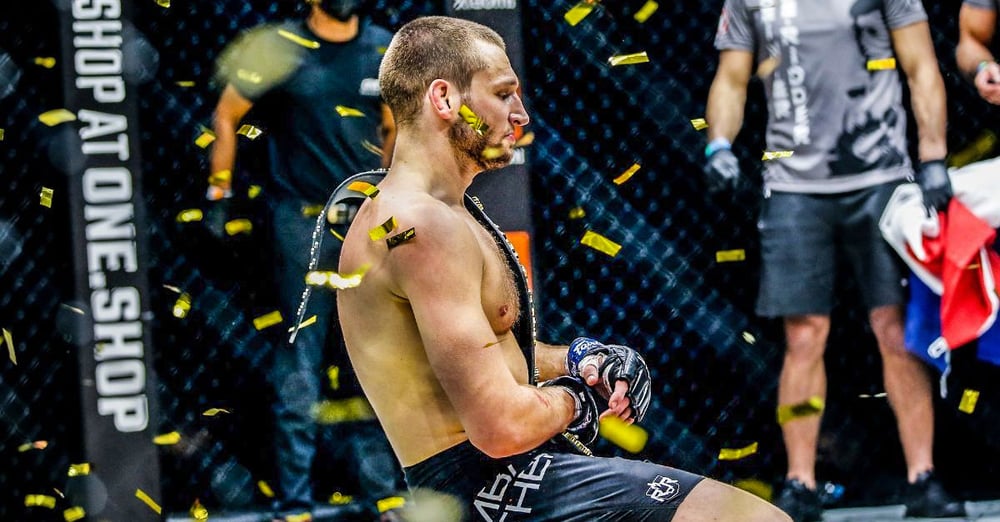
Getting To The Top And Staying There
When Reinier de Ridder won back-to-back fights against Aung La N Sang to become MMA’s first undefeated two-weight world champion, he set his sights on breaking new ground. He decided to cut back on his work as a physical therapist, where he worked next door to his gym, although he still maintains this on the side. His motivation came from wanting to face the best possible opponents with one eye on becoming the first-ever three-weight world champion. That plan was put on hold when he suffered his first career loss to Anatoly Malykhin in 2022. It was clearly sparked a desire in Anatoly who has since gone on to achieve this feat. For de Ridder, losing his light heavyweight title in the process was a significant setback but coincided with a change in mentality and drive.
De Ridder explains how he has become more single-minded about what matters to him during his time as a champion. “I was really busy with achieving and getting belts and whatever and, in the long term, getting as much stuff done as possible, but I've kind of done it, right? I've got the belts, I'm happy there, but there are still a couple of things I need to do and the focus shifted towards that, especially after the loss this time.” He continued, “It's not about being well known, it's not about making money, it's not about all this nonsense. I just need to finish my business.”
If any of this sounds a little like ticking things off a shopping list (eat your heart out Verstappen), that’s a fairly accurate insight into the almost eerie sense of calmness and composure that best defines his approach to MMA. His clockwork-like performances and dominant form did come back to bite him to some degree in his loss to Malykhin, as he confessed when reflecting on what went wrong for him on that night in the Philippines.
The 33-year-old spoke about his momentary lapse in concentration when expressing where he draws motivation from at this stage in his career. “I kind of lost track of what makes me great at this stuff. I kind of lost track of my own development, my own focus on the small things in my game. I was still training hard but I maybe watched like two fights of Malykhin before the fight.
“It was five weeks before the fight that I got the call. I just accepted, and I thought, like it's just another guy, and when I fight guys, I just take them down, choke them out. I wasn't really too concerned with whatever he brought to the table, and I was forced to learn a little bit in this regard.”
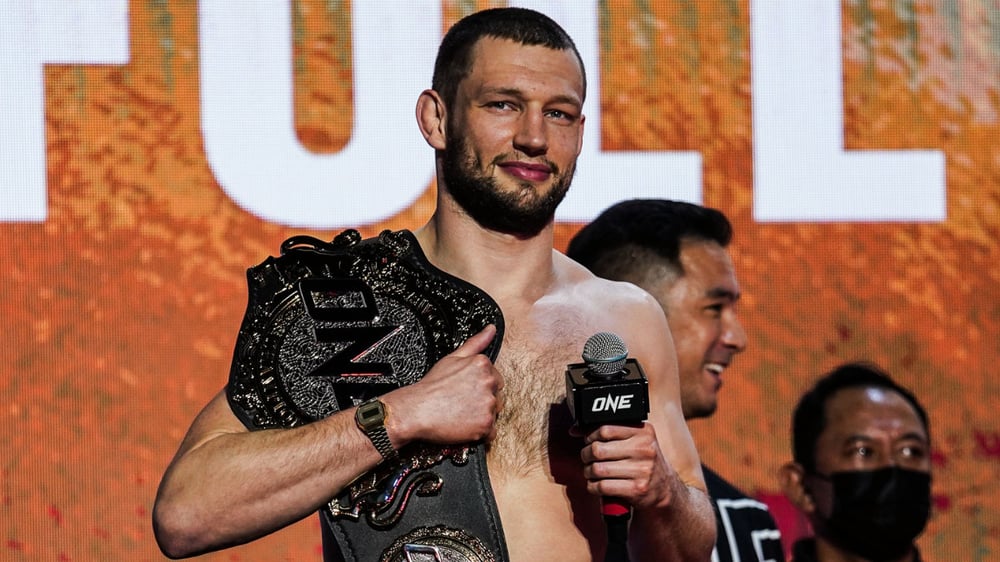
“The Best In The World Outside Of The UFC”
Despite his loss to Anatoly Malykhin, Reinier de Ridder was previously undefeated in his natural weight class at middleweight (which is higher than the standard 185-pound weight category due to ONE’s hydration testing program). There is more talk right now about some of the best fighters in the world being outside of the UFC than there has been for a long time, but even before this became a regular topic of discussion, “The Dutch Knight” was a name that many put forward. De Ridder admits that the period of people questioning whether he was the best middleweight in the world was a frustrating time for him to some degree. He continued to rack up impressive wins, but he couldn't prove what he believed to be true without some of the bigger names to test himself against. It’s one of the few regrets that he has about his career.
During the absolute peak of his acknowledgment from the wider MMA world, a superstar reigned in the UFC’s middleweight division. Israel Adesanya is undoubtedly one of the greatest middleweights of all time, but he also appears to be the flipped side of a coin to the champion who made his name on the opposite side of the world. His grappling style, best described by analyst Dan Hardy as an “aggressive Jiu-Jitsu octopus” during a breakdown of his fight with Malykhin, had many believing that he could be the man to dethrone Adesanya if they were to meet during the first title reign of “The Last Stylebender.”
Having been asked to speak on Adesanya and Alex Pereira later on, throughout his reign as a world champion, de Ridder has gone from considering him a rival to someone he can learn from in his career. “Talking about a guy like Adesanya who at that time, like a couple years ago, I always thought like that's an easy opponent for me.” de Ridder reminisced.
“It would be easy to choke a guy out like that, but I've really gotten a lot of respect for him for what he's done in these last couple of fights. Him coming back after that loss to Pereira, after all those losses to Pereira, and then coming back, knocking him out. To be honest, he's a big inspiration to me at the moment.”
Having trained worldwide with many of the top middleweights, the ONE athlete has never been short on confidence. One of his main training partners during his time at the top has been Gegard Mousasi, another fighter who prompted conversations as to whether the best fighter in a weight class wasn’t competing inside the Octagon following his UFC departure back in 2017. At this stage in his career, he still looks back with wishes of it being different, but for the time being, those kinds of pursuits are way out of sight and, therefore, out of mind.
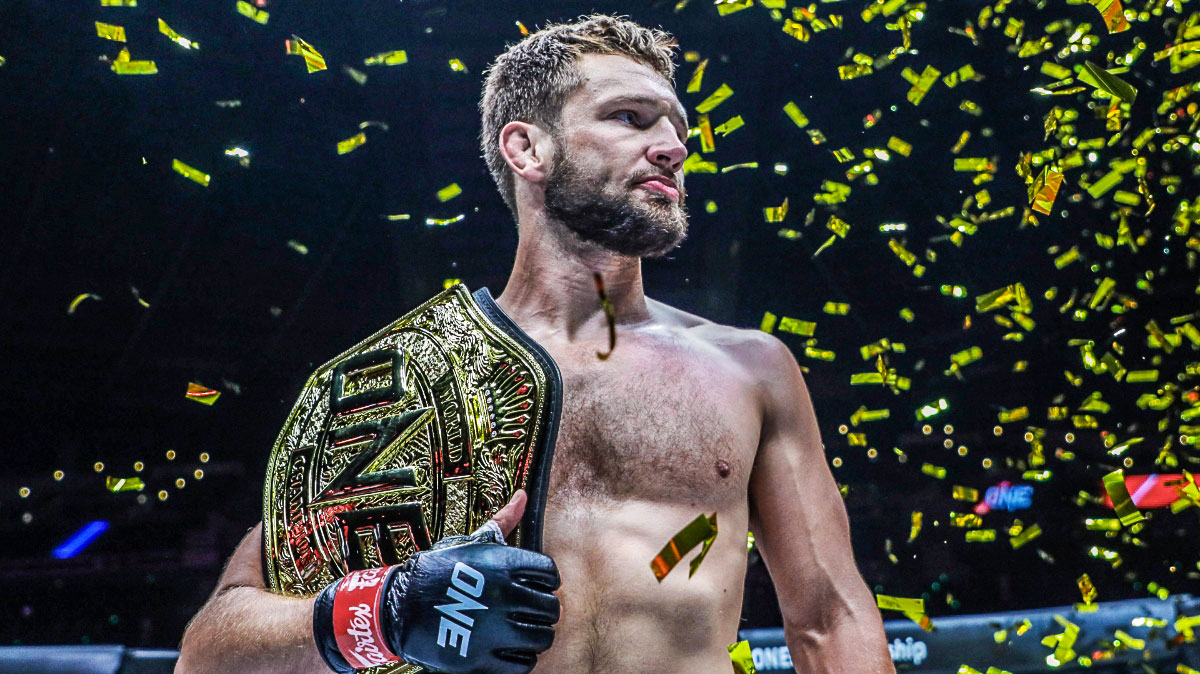
Leaving Something Behind
Reinier de Ridder laughed off the idea of him growing up with any kind of idol or inspiring figure in his pursuit of glory. “I'm a Dutch guy man, I'm true Dutch. I was never one to idolize at a younger age. Now that I know what you need to do to become one of the best in the world, I look up to people who do special things a lot more than I used to in the past.”
With his change in perspective on his career, his idea of leaving a lasting legacy behind has also shifted over time. He’s still motivated to chase the biggest challenges out there and secure as many wins as possible, having stated that he only has a few years left in MMA. Coming from humble, middle-class beginnings in a culture that doesn’t put anybody on a pedestal, arguably, the most Dutch thing about Reinier de Ridder is the legacy he wants to leave behind.
He was driven to become the best and prove it to the world, but having tasted the sweet nectar of both success and defeat, he now finds himself satisfied by simply focusing on being the best he can be in life as a whole.
“I'm very happy to do positive stuff for people as well. In the gym, to teach the people that come to my gym is a very important thing for me too, because that's a clear way I can really influence people's lives in a positive way. Then in my personal life, to be the best dad I can be to provide for them in the best way.” de Ridder continues, “Those things are equally important as being the best fighter in the world, and then we'll see how many guys I can beat and what kind of legacy I can leave there, but it's getting more important for me to also give back in other areas. Not just being the brash guy, talking shit and whatever.”
“It's not as important as it used to be.”
“The Dutch Knight” was unable to gain redemption when he faced Anatoly Malykhin for a second time at ONE 166 in defense of his middleweight world championship. While he hoped to show his evolution as a fighter after his first career loss, his opponent was able to make history as a three-weight world champion. Someone had to do it first and it's a rare thing for two fighters to be chasing the same seemingly impossible dream.

